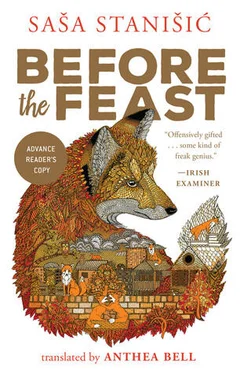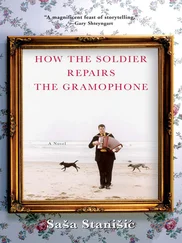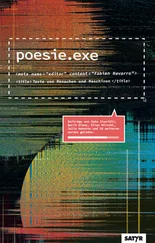The weekend will be dynamic, heated and fast-moving. Saturday begins in confusion. If you happen to suffer from insomnia, expect a sleepless night. Give all you’ve got, and you will find the sense in it . That, for instance, is what she predicted on Friday for Cancer, the Crab. Frau Schwermuth loosens up her neck muscles. Her star sign is the Crab.
Every year Frau Schwermuth invites Breakfast TV to the Anna Feast. An outside transmission about the festivities would be great. A fax goes to the TV station and another to Britta Hansen. Frau Schwermuth always gets a reply from Frau Hansen. Britta would really love to come, she says, but unfortunately she’s not the one who makes such decisions, her hands are tied.
At the end of her horoscopes Britta Hansen quotes a proverb, an old saying, or a quotation from some famous person: If you are going the wrong way, the faster you walk the more lost you will be .
Frau Schwermuth once said that even as a child Britta was interested in the sky, which is particularly beautiful in these parts. She really wanted to study physics but, fair enough, it turned into something like metaphysics. “Metaphysics between us and the stars.”
Frau Schwermuth’s eyes glow as she looks at the unblinking screen. Now and then her pupils move to the extreme left and then the extreme right. All of life , says Britta Hansen, smiling at Frau Schwermuth, is a matter of beginning again .
“Very true,” whispers Frau Schwermuth. She switches the TV off and goes down to the cellar. She has a few more questions for the tinker.
Fürstenfelde, Brandenburg. Number of inhabitants: dropping. We have a sign up at the entrance to the village. Welcome to the Uckermark. The countryside gets beautiful here . Number of trees marked on the up-to-date walkers’ map as “individual trees worth seeing”: two.
Whatever you’ve heard about us that doesn’t come from ourselves is wrong. This village is not like what they say in the tourist guides, the books, the demographic studies. If a window gets broken somewhere here, and stands open, we’re more afraid of what might get out through it than what might get in.
And you mustn’t believe that stupid map: we have a third individual tree worth seeing — the oak in the field on Geher’s Farm. They like to leave it out of guides because it’s as crooked as backache, and because the field makes no sense for even the most ambitious walker, although the tree is really old and any other 500-year-old oak has a blog of its own.
But the fact is that many people were hanged from that oak tree over the centuries, and we sometimes feel so angry that we’d like to have the whole field covered with cement, not because we’re angry with the field and the oak tree, but because apart from Frau Schwermuth no one’s interested. There isn’t even a plaque about it anywhere.
But we digress.
On such a night as this.
AT WHITSUNTIDE IN THE YEAR OF OUR LORD 1619, a farm worker by the name of Drewes was stabbed. The Murderer ran away, and did not return for Eight Years, but in the end came back of his own Accord, believing that the Crime would have been Forgot. He was taken, kept close confin’d, and met his well-deserv’d End hanging from a Rope.
SO HERR SCHRAMM, FORMERLY LIEUTENANT-Colonel, forester, pensioner, takes the pistol away from his temple and unlocks the car door for the girl. Anna turns the beam of her headlight on him.
“What are you doing with that pistol?”
She dazzles him; it’s like being interrogated.
“Hmm, well.”
“Put it away.”
Herr Schramm puts the pistol away in his tracksuit trousers.
Anna gets into the passenger seat.
“Schramm. Pleased to meet you.”
“I know who you are.” Anna switches the interior light of the car on and her headlight off.
“Mhm,” says Herr Schramm. He rubs his eyes. He feels sad to realize that he is rubbing his eyes, so he asks, “What are you doing out here?”
“Running.”
“That’s dangerous.”
“I’m also getting into cars with crazy guys carrying guns in a field in the middle of the night.”
Herr Schramm turns away. There is the night, there is the tree, and there is the field. Anna is looking steadfastly at him. He has bags under his eyes, broken veins on his nose, little hairs in his ears. Herr Schramm looks like someone who doesn’t have ambitious plans for his body these days.
“I’m not crazy,” says Herr Schramm.
Unshaven, greasy hair. Herr Schramm looks like someone who goes to sleep on the toilet with his toothbrush in his mouth. Who wakes up, screaming, and doesn’t know when or where he is. If that were so, at least Schramm would say, honestly, why the nightmare? But what good does that do?
The vest and tracksuit trousers, his unshaven face and general look of decrepitude are deceptive. Over the last few days Herr Schramm hasn’t done much, that’s all. He washes with a mild, cream soap, without overdoing it. He regularly cleans his house, except for on top of the cupboards, because why bother? He even looks after his little garden the way others might look after a family member — reluctantly and with a sense of duty. All those tiresome little jobs to be done: turning over the soil, weeding, bush tomatoes, birthdays, shopping, visits to old people’s homes. His father the drunk had the same little broken veins, it’s hereditary. Statistically. Herr Schramm also knows that regularly washing the hair weakens it. It can’t cope so well with the artificial effect of the shampoo. That’s what happens to a man in general when he lets things go.
Anna takes a deep breath. It works okay. She says, “You were going to kill yourself.”
Herr Schramm says, “Right.”
Anna says, “What do I do now?”
Herr Schramm tries to start the car, but the engine won’t catch.
“When you go running,” says Herr Schramm, “I suppose you don’t take cigarettes with you?”
“I don’t smoke at all.”
“Do you have your ID on you?”
“What for?”
“I don’t have mine on me. No driving license, nothing. You could get me some cigarettes. Or if not you could fetch your ID and then get me some cigarettes.”
“Why don’t you go and fetch yours?”
“I won’t have the time before I commit suicide.”
Anna doesn’t want to laugh, but she does, briefly. Her breath immediately comes with difficulty.
“I want to smoke another cigarette,” says Herr Schramm. “The tank’s empty, and I live out there toward Parmen, while you live here only just beyond the rise in the ground. You’re the toymaker Geher’s granddaughter, aren’t you? We can do it within ten minutes, and then we each go our own way.”
Anna shakes her head. No, she is not leaving him alone. If need be she’ll take him somewhere. Home, to his family. Does he have a family? Is he married?
Herr Schramm has a family, but you know how it is. And women? He thought about women one last time in the summer, weighing up the pros and cons. Looked around. But at his age, and with his history? And in our village, where few of us say what we feel. Difficult. Widows at the outside. But widows make you think of loneliness in old age. Difficult.
The ferryman told him about the dating agency, where you can pinpoint the pros and rule out the cons. The same as in the army. Herr Schramm liked that idea. And he had instinctively liked Frau Mahlke. How wrong can you be? She simply never got in touch again. He had phoned, asking if he’d done anything wrong. She could tell him, he said. He’d spent a lifetime making either no mistakes or a lot of them, depending who you ask. Today, however, he’d admit to his mistakes, and making another didn’t matter now.
Frau Mahlke had sounded funny on the phone. Funny wasn’t all right. Herr Schramm couldn’t think of any reason for her to sound funny. If she’d told him a reason, that would have been all right. Had he said something? Was he just too old?
Читать дальше












